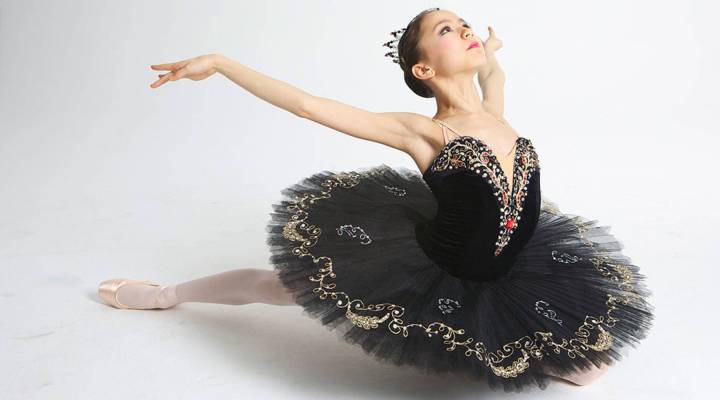
The price of staying en pointe

Tess Vigeland: Earlier we explored the cost of kids’ sports. Well this weekend, a documentary film called “First Position” opens across the country. It’s about the Youth America Grand Prix ballet competition.
Marketplace’s Stacey Vanek Smith spoke to one of the dancers featured in the film to learn the cost of becoming a professional ballerina.
Stacey Vanek Smith: At the Manhattan Movement and Arts Center on New York’s Upper West Side, dancers line up at the barre, practicing jumps.
Fourteen-year-old Miko Fogarty is at the center, to practice a piece from “Giselle.” She danced this routine a couple of weeks ago at Lincoln Center for the Youth America Grand Prix Ballet finals. She says getting there took 10 years of daily grind.
Miko Fogarty: Normally, I have an open class in the morning, and then I have a private with my teacher for like 45 minutes, and then I have class, and then I go home and than I do my homework. I normally take like one day off a month or two months.
The classes Miko’s talking about are all ballet classes. Miko does her schooling online. Her routine is chronicled in the documentary, “First Position.” Bess Kargman directed the film. Kargman says she was stunned by how much work and money it takes to go pro.
Bess Kargman: It’s incredible. A commonality between any family that is extremely serious about a child making it as a dancer: The fees are astronomical.
Satoko Fogarty: My name is Satoko, Miko’s mom.
Satoko Fogarty and Miko list off some of the expenses associated with trying to be the best in ballet.
Satoko: Miko needs classical tutus, which we ordered in Japan, because there’s a really really good costume maker. This costume is like $2,000, which is normal. Then I needed six tutus, which is $12,000.
Miko: My pointe shoes are around $90-100 and I have about two or three a month.
Satoko: $35,000 for tuition, which includes class and private lesson almost six days a week. $35,000 a year. That’s at least, it might be more.
Miko: We have to go to ballet competitions and we have to travel for that, so we have to pay for the hotel and the competition expense and the flights.
It all totals about $50,000 a year. Satoko Fogarty admits, she’s never added it up before.
Satoko: My husband tells me to budget, but I can’t budget, and I see this figure and I’m sort of surprised today.
The risks of investing so much money in your budding ballerina are extreme. The aim is to become a professional dancer, but injury rates are high and salaries are low. Ballet dancers start out earning about $60,000 a year — and pay raises are rare. That’s if you can get a job in the first place, says Kargman.
Kargman: Since 2007, 2008, companies are shedding dancers. They’re rarely hiring them.
Careers are also pretty short: Dancers usually go pro around 17 and a lucky dancer will retire around age 40. But, Miko says, she wouldn’t choose any other career.
Miko: I just would feel like something’s not complete in my life. I love performing on stage so much. It brought so many emotions. I love the process of working with your coach or teacher.
Miko plans to go pro in a few years. It’s her dream to dance with the Royal Ballet in London.
In New York, I’m Stacey Vanek Smith for Marketplace.
There’s a lot happening in the world. Through it all, Marketplace is here for you.
You rely on Marketplace to break down the world’s events and tell you how it affects you in a fact-based, approachable way. We rely on your financial support to keep making that possible.
Your donation today powers the independent journalism that you rely on. For just $5/month, you can help sustain Marketplace so we can keep reporting on the things that matter to you.











